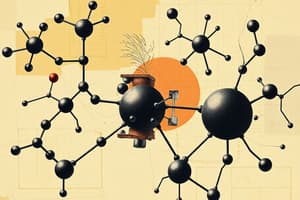Podcast
Questions and Answers
What main component forms the structure of plant cell walls?
What main component forms the structure of plant cell walls?
- Starch
- Cellulose (correct)
- Glycogen
- Chitin
Which type of lipid is primarily involved in forming cell membranes?
Which type of lipid is primarily involved in forming cell membranes?
- Phospholipids (correct)
- Waxes
- Steroids
- Triglycerides
What are fats primarily used for in biological systems?
What are fats primarily used for in biological systems?
- Energy storage (correct)
- Structural components of cells
- Genetic information
- Hormonal functions
What are steroids characterized by?
What are steroids characterized by?
How are amino acids linked to form proteins?
How are amino acids linked to form proteins?
Which of the following describes a key function of proteins?
Which of the following describes a key function of proteins?
What do the R groups in amino acids determine?
What do the R groups in amino acids determine?
Which lipid is primarily composed of glycerol and three fatty acids?
Which lipid is primarily composed of glycerol and three fatty acids?
What are the four major classes of organic macromolecules?
What are the four major classes of organic macromolecules?
Which type of carbohydrate is composed of two monosaccharides?
Which type of carbohydrate is composed of two monosaccharides?
What is the main function of carbohydrates in cells?
What is the main function of carbohydrates in cells?
Which of the following is an example of a polysaccharide?
Which of the following is an example of a polysaccharide?
What are monomers?
What are monomers?
Glycogen serves what primary function in animals?
Glycogen serves what primary function in animals?
Which of the following is a monomer of carbohydrates?
Which of the following is a monomer of carbohydrates?
What reaction joins two monosaccharides to form a disaccharide?
What reaction joins two monosaccharides to form a disaccharide?
Flashcards are hidden until you start studying
Study Notes
Molecules of Life Overview
- Cells are primarily composed of water and carbon-based organic compounds.
- Organic compounds contain carbon; simplest form is hydrocarbons (only carbon and hydrogen).
- Four major classes of organic molecules: carbohydrates, lipids, proteins, and nucleic acids.
Organic Molecules Characteristics
- Known as macromolecules due to large size.
- Also referred to as polymers, constructed from smaller subunits called monomers.
- Monomers serve as building blocks for larger polymers.
Carbohydrates
- Main source of energy for cellular functions.
- Building blocks are simple sugars known as monosaccharides.
- Three classes include:
- Monosaccharides: Simple sugars (e.g., glucose, fructose, galactose).
- Disaccharides: Formed from two monosaccharides via dehydration reactions (e.g., sucrose, maltose, lactose).
- Polysaccharides: Long chain polymers made of monosaccharides (e.g., starch, glycogen, cellulose).
Lipids
- Hydrophobic compounds that do not mix well with water.
- Key types include fats, phospholipids, and steroids.
- Fats serve mainly as energy storage, composed of glycerol and fatty acids, typically in triglyceride form.
- Phospholipids form cell membranes, consisting of two fatty acids and a phosphate group, creating hydrophobic tails and hydrophilic heads.
- Steroids consist of fused ring structures; cholesterol is an important steroid that supports cell membrane structure and synthesizes sex hormones.
Proteins
- Polymers made from amino acid monomers.
- Composed of 20 different amino acids linked by peptide bonds, creating long protein chains.
- Amino acids consist of an amino group, a carboxyl group, and a variable side chain (R group).
- Functions encompass:
- Structural components (e.g., actin, myosin in muscles).
- Defensive roles (e.g., antibodies).
- Transport functions (e.g., hemoglobin).
Studying That Suits You
Use AI to generate personalized quizzes and flashcards to suit your learning preferences.



